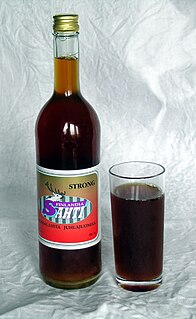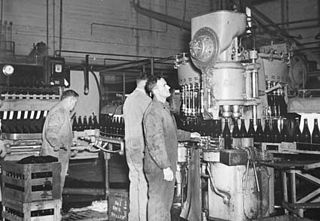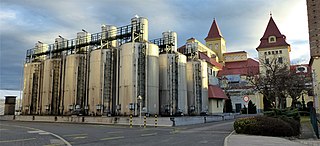
A craft brewery or microbrewery is a brewery that produces small amounts of beer, typically less than large breweries, and is often independently owned. Such breweries are generally perceived and marketed as having an emphasis on enthusiasm, new flavours, and varied brewing techniques.

Sahti is a Finnish type of farmhouse ale made from malted and unmalted grains including barley and rye. Traditionally the beer is flavored with juniper in addition to, or instead of, hops; the mash is filtered through juniper twigs into a trough-shaped tun, called a kuurna in Finnish. Sahti is top-fermented and many have a banana flavor due to isoamyl acetate from the use of baking yeast, although ale yeast may also be used in fermenting.

Welsh beer is beer brewed in Wales.

Beer arrived in Australia at the beginning of British colonisation. In 2004 Australia was ranked fourth internationally in per capita beer consumption, at around 110 litres per year; although, the nation ranked considerably lower in a World Health Organization report of alcohol consumption per capita of 12.2 litres. Lager is by far the most popular type of beer consumed in Australia.

Beer in Hungary has been brewed for well over a thousand years and the country has a significant history of commercial beer production.

Beer in South Africa has a long history, with a corporate history dating back to the early 20th century.
Beer in Africa, especially lager, is produced commercially in most African countries, and varieties of beer are also made by indigenous people. Beer is served in a range of locales, from neighbourhood shebeens to upscale bars. Many countries have standardized beer bottle sizes, which are cleaned and re-used, and so when buying beer at a store often people must pay a deposit on the bottle as well as the price of the beer. An alternative to glass-bottle beers is local beer sold in tetra-pak style paper cartons.

Brewing in Ireland has a long history. Production currently stands at over 8 million hectolitres, and approximately half the alcohol consumed is beer.

Brewing beer in Thailand began in 1933 with the granting of a brewing license to 57-year-old Phraya Bhirom Bhakdi, born Boon Rawd Sreshthaputra. His company, Boon Rawd Brewery, produces Thailand's oldest and best-known lager, Singha. Singha is sold in Thailand in standard, light, and draught versions.

Beer is the most popular alcoholic drink in New Zealand, accounting for 63% of available alcohol for sale. At around 64.7 litres per person per annum, New Zealand is ranked 27th in global beer consumption per capita. The vast majority of beer produced in New Zealand is a type of lager, either pale or amber in colour, and typically 4–5% alcohol by volume.

Beer in Japan mostly comes from the country's four major breweries, Asahi, Kirin, Sapporo and Suntory, which mainly produce pale lagers around 5% ABV. Beer is immensely popular, far ahead of sake consumption.

Beer in Asia began when beer was produced in Sumer, Mesopotamia circa 6000 years ago. It was introduced by Europeans in the 19th century, with modern breweries established in British India, the Dutch East Indies, China, and Japan. Asia's first modern brewery was established in 1830 in India entirely using European brewing technology.

Finland has a long history of beer dating back to the Middle Ages. The oldest still-existing commercial brewery in Finland and Nordic countries is Sinebrychoff, founded in 1819. The Finnish Beer Day is celebrated on 13 October to commemorate the founding of the Sinebrychoff brewery and the birth of Finnish beer. The largest Finnish brewers are Hartwall, Olvi and Sinebrychoff. Most of the beers brewed in Finland are pale lagers. Finland's standing is 9th in per capita consumption of beer. Finnish people consume a total of 440 ML of beer annually and the trend is increasing by 11.7 633 mL bottles year-on-year per capita.

Farmhouse ale comes from the European tradition of farmers brewing beer for consumption at home or amongst their workers. Most farmers brewed for Christmas and in late summer, but where they had enough grain would produce beer as an everyday drink.

North Korea has at least ten major breweries and many microbreweries that supply a wide range of beer products. The top brand is the light lager Taedonggang by the state-owned Taedonggang Brewing Company.

Beer has been brewed in Estonia for over a thousand years. The first written reference to beer in what is now Estonia dates to 1284. In Estonian, beers are often described as hele (pale) or tume (dark).

Viru Brewery was Estonia's third largest brewery, and produced the Wiru, Puls, Žiguli and various other brands. It was located in Haljala in Lääne-Viru County. Production of beer was discontinued in 2020.

Fat Lizard is a Finnish craft brewery founded in Espoo in 2014. The CEO of the brewery is Eero Kukko. From 2014 to 2020 the CEO of the brewery was Heikki Ylinen.
Finnish alcohol culture refers to the drinking culture regarding beverages containing ethyl alcohol in Finland and to the manners and habits connected to the drinking culture.


















